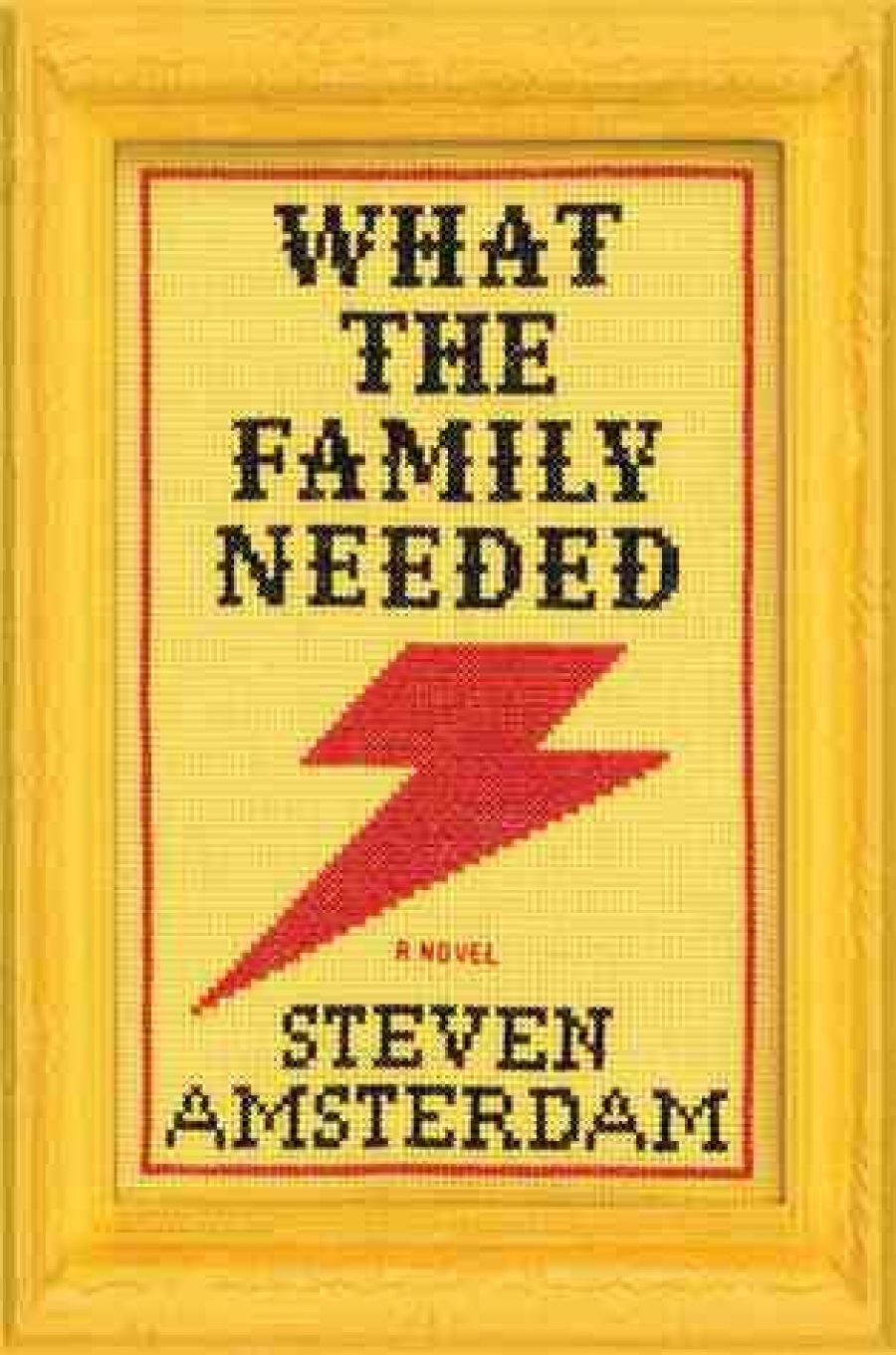
- Free Article: No
- Contents Category: Fiction
- Custom Article Title: Nicolas Low reviews 'What the Family Needed' by Steven Amsterdam
- Review Article: Yes
- Online Only: No
- Custom Highlight Text:
Here is a cliché to start your day: superhuman feats of strength. You find them in disaster stories and war epics, where desperate, adrenalised men push beyond the limits of human ability. Rescuers lift impossibly heavy rubble off earthquake victims; soldiers carry wounded comrades miles to safety. Such feats crop up in more imaginative forms in comic books, where the need to fight crime or save the world spawns the ability to fly or dodge bullets. In Steven Amsterdam’s ingenious What the Family Needed, the idea of exceptional abilities for exceptional times is applied to the family. Amsterdam seems to have posed the question: ‘what super powers would a family develop to cope with the emotional crises of everyday life?’ The answer is best summed up as superhuman feats of empathy.
- Book 1 Title: What the Family Needed
- Book 1 Biblio: Sleepers Publishing, $24.95 pb, 284 pp, 9781742702117
The book drops us straight into the fractured world of Giordana, Ben, and their mother, Ruth, who visit relations after Ruth has, once and for all, left her alcoholic husband. Their seven-year-old cousin Alex meets them on the lawn and asks, ‘Okay, tell me which do you want, to be able to fly or to be invisible?’ It’s a child’s play question. As the distress of the adult world spills over into that of the children, Giordana idly thinks ‘invisibility would have been a relief’. Without missing a beat or shifting tone, Amsterdam shows that Giordana has indeed become invisible. As the family’s powers are slowly revealed, there is considerable vicarious pleasure in watching them test the benefits, limits, and repercussions of their new-found abilities.
What the Family Needed is structurally similar to Amsterdam’s first novel, Things We Didn’t See Coming (2009), jumping forward one, five, or ten years in time between each chapter. Over a thirty-year span, the novel presents us with an interwoven, almost Cubist portrait of a family that is as ordinary as it is remarkable. The superhuman abilities clearly involve fantasy, and suggest magic realism as an influence on the author, but there is something quite natural about the way the characters’ abilities grow from their circumstances, in an almost evolutionary fashion. It would be misleading to categorise the book too strongly with these terms. First and foremost, it is an intimate, humorous, and astute portrait of family life, with a single detail pushed beyond the real in each chapter.
In Amsterdam’s universe, the pull of character, upbringing, and habit is more profound than that of gravity. When Ben, burdened by fatherhood and a barely functional relationship, finds himself literally able to fly away from it all, he flirts with the idea of becoming a crime-fighting superman. ‘Who was he fooling? He wasn’t the type to seize such a chance.’ Nor is there any escaping the consequences of your actions, superpowers or otherwise. As with Greek mythology, special powers can be as much a curse as a blessing. Alex wishes the power of absolute lucidity upon his girlfriend. She sees instantly that they are unsuited, and dumps him on the spot. ‘Just because it was magic didn’t mean it was easy.’
What the Family Needed is knowing in its handling of the complex relationship between what is magic and what is real, and indeed has this as its central theme. Amsterdam places the reader’s doubts in the mouths of his characters. Can Ben really fly, or is he hallucinating? Is Ruth hellishly overtired, or has she developed the ability to hear the thoughts of those around her? Consistent throughout is the spectre that there are no special powers, but rather, stress, exhaustion, and mental illness. The more explicitly the latter become factors, the more the book’s playful tone takes on a darker aspect.
At the centre of the novel is Alex, who grows from an idiosyncratic child into an unstable adult. A troubled enigma for much of the book, he flits in and out of his relations’ lives, always present but never truly visible. Through him, the question of fantasy and reality comes most sharply into relief. His opening question to Ben and Giordana frames him as the source and origin of these powers, and as we learn the secrets of everyone other than Alex, questions inevitably arise. What is Alex’s own power? What is it that he needs? And is all of this the product of his misfiring imagination? Alex’s parents, and onlookers, assume that he suffers some form of mental illness. The final chapter gives us the answer, but in a way that leaves the question more open than resolved. When we finally hear Alex’s story, the writing takes on an opaque quality as the author wrestles with a series of fascinating but complicated abstractions about time, memory, and sanity.
Underpinning the entire enterprise is Amsterdam’s ability to write remarkable characters; this animates the novel more than his speculative imaginings. If anything, the level of self-awareness displayed by his characters is the hard part to swallow. Giordana is possibly the most emotionally articulate teenager in the world – fictional or otherwise – and cousin Peter, who spends much of the book as a stubborn, judgemental tyrant, reaches a level of clarity that stretches the bounds of possibility. We must occasionally suspend our disbelief that people could perform such superhuman feats of empathy in real life.


Comments powered by CComment